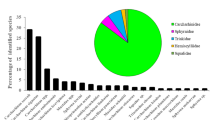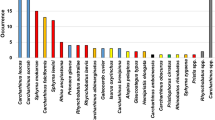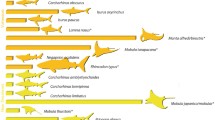Abstract
Sharks developed life history traits that make them susceptible to overfishing. This is, in turn, a risk for extinction, and several species are affected. The high price of shark fins in the international trade has triggered the widespread capture of sharks at unsustainable levels, prompting illegal and unethical practices, such as finning. To address these concerns, the present study aimed to identify species composition using molecular techniques based on DNA barcoding and DNA polymorphism on samples taken from illegal shark fin seizures conducted by the Federal Environmental Agency of Brazil. A species-specific DNA-based identification from three finning seizures in Brazil found at least 20 species from 747 shark fins, some of which were identified as endangered and protected under Brazilian legislation, while others were representative of restricted catches, according to Appendix II of CITES. In the seizure from Belém, 338 fins were identified as belonging to at least 19 different species, while in the seizure from Natal 211, fins belonging to at least 8 different species were identified. Furthermore, 198 fins from Cananéia were identified through PCR-Multiplex as belonging to Isurus oxyrinchus. These results raise concerns about the environmental and socioeconomic effects of finning on developing countries. Furthermore, this study represents the first finning evaluation from Brazil in the Southwest Atlantic, highlighting the importance of developing policies aimed toward restricting and regulating the shark trade and detecting IUU fisheries and illegal trade of endangered species, mainly in developing countries, where fisheries management, surveillance, and species-specific fisheries catch data are often sporatic.




Similar content being viewed by others
References
Almerón-Souza F, Sperb C, Castilho CL, Figueiredo PI, Gonçalves LT, Machado R, Oliveira LR, Valiati VH, Fagundes NJ (2018) Molecular identification of shark meat from local markets in southern brazil based on DNA barcoding: evidence for mislabeling and trade of endangered species. Front Genet 9:138. https://doi.org/10.3389/fgene201800138
Altschul SF, Gish W, Miller W, Myers EW, Lipman DJ (1990) Basic local alignment search tool. J Mol Biol 215:403–410. https://doi.org/10.1016/S0022-2836(05)80360-2
Amorim AF, Arfelli CA, Fagundes L (1998) Pelagic elasmobranchs caught by longliners off southern Brazil during 1974–97: an overview. Mar Freshw Res 49(7):621–632. https://doi.org/10.1071/MF97111
Arancibia H, Neira S (2005) Long-term changes in the mean trophic level of Central Chile fishery landings. Sci Mar 69(2):295–300. https://doi.org/10.3989/scimar.2005.69n2295
Baeta F, Costa MJ, Cabral H (2009) Changes in the trophic level of Portuguese landings and fish market price variation in the last decades. Fish Res 97(3):216–222. https://doi.org/10.1016/j.fishres.2009.02.006
Barbuto M, Galimberti A, Ferri E, Labra M, Malandra R, Galli P, Casiraghi M (2010) DNA barcoding reveals fraudulent substitutions in shark seafood products: the Italian case of “palombo” (Mustelus spp.). Food Res Int 43(1):376–381. https://doi.org/10.1016/j.foodres.2009.10.009
Barreto R, Ferretti F, Flemming JM, Amorim A, Andrade H, Worm B, Lessa R (2016) Trends in the exploitation of South Atlantic shark populations. Conserv Biol 30:792–804. https://doi.org/10.1111/cobi12663
Barreto RR, Bornatowski H, Motta FS, Santander-Neto J, Vianna GMS, Lessa R (2017) Rethinking use and trade of pelagic sharks from Brazil. Mar Policy 85:114–122. https://doi.org/10.1016/j.marpol.2017.08.016
Benson DA, Cavanaugh M, Clark K, Karsch-Mizrachi I, Lipman DJ, Ostell J, Sayers EW (2017) GenBank. Nucleic Acids Res 46:D41–D47. https://doi.org/10.1093/nar/gkx1094
Bland LM, Collen BEN, Orme CDL, Bielby JON (2015) Predicting the conservation status of data-deficient species. Conserv Biol 29:250–259. https://doi.org/10.1111/cobi12372
Bonfil R (1994) Overview of world elasmobranch fisheries. Food and Agriculture Organization of the United Nations, Rome
Bornatowski H, Angelini R, Coll M, Barreto RR, Amorim AF (2018) Ecological role and historical trends of large pelagic predators in a subtropical marine ecosystem of the South Atlantic. Rev Fish Biol Fish 28(1):241–259. https://doi.org/10.1007/s11160-017-9492-z
Bradley D, Gaines SD (2014) Extinction risk: counting the cost of overfishing on sharks and rays. eLife 3:e02199. https://doi.org/10.7554/eLife02199
Bunholi IV, Ferrette BLS, De Biasi JB, Magalhães CO, Rotundo MM, Oliveira C, Foresti F, Mendonça FF (2018) The fishing and illegal trade of the angelshark: dNA barcoding against misleading identifications. Fish Res 206:193–197. https://doi.org/10.1016/jfishres201805018
Butchart SH, Bird JP (2010) Data deficient birds on the IUCN Red List: what don’t we know and why does it matter? Biol Conserv 143:239–247. https://doi.org/10.1016/jbiocon200910008
Camhi MD, Fordham SV, Fowler SL (2008) Domestic and international management for pelagic sharks. Sharks of the open ocean. Blackwell, Oxford, pp 418–444
Cardeñosa D, Fields AT, Babcock EA, Zhang H, Feldheim K, Shea SK, Fischer GA, Chapman DD (2018) CITES-listed sharks remain among the top species in the contemporary fin trade. Conserv Lett 11:e12457. https://doi.org/10.1111/conl12457
Cardeñosa D, Shea KH, Zhang H, Feldheim K, Fischer GA, Chapman DD (2019) Small fins, large trade: a snapshot of the species composition of low-value shark fins in the Hong Kong markets. Anim Conserv. https://doi.org/10.1111/acv.12529
Cerutti-Pereyra F, Meekan MG, Wei NWV, O’Shea O, Bradshaw CJ, Austin CM (2012) Identification of rays through DNA barcoding: an application for ecologists. PLoS ONE 7(6):e36479. https://doi.org/10.1371/journal.pone.0036479
Chapman DD, Pinhal D, Shivji MS (2009) Tracking the fin trade: genetic stock identification in western Atlantic scalloped hammerhead sharks Sphyrna lewini. Endanger Species Res 9:221–228. https://doi.org/10.3354/esr00241
CITES (2018) CITES trade statistics derived from the CITES Trade Database. UNEP World Conservation Monitoring Centre, Cambridge. https://trade.cites.org/. Accessed 14 Dec 2018
CITES-CoP18 (2019) Eighteenth meeting of the conference of the parties of the convention on international trade in endangered species of Wild Fauna and Flora. https://citessharks.org/. Accessed 30 Aug 2019
Clarke S (2004) Shark product trade in Hong Kong and mainland China and implementation of the CITES shark listings. TRAFFIC East Asia, Hong Kong, China.
Clarke S (2008) Use of shark fin trade data to estimate historic total shark removals in the Atlantic Ocean. Aquat Living Resour 21(4):373–381. https://doi.org/10.1051/alr:2008060
Clarke SC, Magnussen JE, Abercrombie DL, McAllister MK, Shivji MS (2006a) Identification of shark species composition and proportion in the Hong Kong shark fin market based on molecular genetics and trade records. Conserv Biol 20:201–211. https://doi.org/10.1111/j1523-1739200500247x
Clarke SC, McAllister MK, Milner-Gulland EJ, Kirkwood GP, Michielsens CG, Agnew DJ, Pikitch EK, Nakano H, Shivji MS (2006b) Global estimates of shark catches using trade records from commercial markets. Ecol Lett 9:1115–1126. https://doi.org/10.1111/j1461-0248200600968x
Clarke S, Milner-Gulland EJ, Bjørndal T (2007) Social, economic, and regulatory drivers of the shark fin trade. Mar Res Econ 22(3):305–327
Cochrane KL, Doulman DJ (2005) The rising tide of fisheries instruments and the struggle to keep afloat. Philos Trans R Soc B 360(1453):77–94. https://doi.org/10.1098/rstb.2004.1568
Coelho R, Mejuto J, Domingo A, Yokawa K, Liu KM, Cortés E, Romanov EV, Silva C, Hazin FHV, Arocha F, Mwilima AM (2018) Distribution patterns and population structure of the blue shark (Prionace glauca) in the Atlantic and Indian Oceans. Fish Fish 19:90–106. https://doi.org/10.1111/faf12238
Corrigan S, Delser PM, Eddy C, Duffy C, Yang L, Li C, Bazinet AL, Mona S, Naylor GJ (2017) Historical introgression drives pervasive mitochondrial admixture between two species of pelagic sharks. Mol Phylogenet Evol 110:122–126. https://doi.org/10.1016/jympev201703011
Cortés E, Arocha F, Beerkircher L, Carvalho F, Domingo A, Heupel M, Holtzhausen H, Santos MN, Ribera M, Simpfendorfer C (2010) Ecological risk assessment of pelagic sharks caught in Atlantic pelagic longline fisheries. Aquat Living Resour 23:25–34. https://doi.org/10.1051/alr/2009044
Cortés E, Domingo A, Miller P, Forselledo R, Mas F, Arocha F, Campana S, Coelho R, Da Silva C, Hazin FHV, Holtzhausen H (2015) Expanded ecological risk assessment of pelagic sharks caught in Atlantic pelagic longline fisheries. Collect Vol Sci Pap ICCAT 71:2637–2688
Darriba D, Taboada GL, Doallo R, Posada D (2012) jModelTest 2: more models, new heuristics and parallel computing. Nat Methods 9:772. https://doi.org/10.1038/nmeth2109
Davidson LN, Krawchuk MA, Dulvy NK (2016) Why have global shark and ray landings declined: improved management or overfishing? Fish Fish 17:438–458. https://doi.org/10.1111/faf12119
de Bruyn P (2017) Report of the 2017 ICCAT Shortfin mako assessment meeting. International Commission for the Conservation of Atlantic Tunas, Madrid
de Mitcheson YS, Andersson AA, Hofford A, Law CS, Hau LC, Pauly D (2018) Out of control means off the menu: the case for ceasing consumption of luxury products from highly vulnerable species when international trade cannot be adequately controlled; shark fin as a case study. Mar Policy 98:115–120
De-Franco B, Mendonça FF, Oliveira C, Foresti F (2012) Illegal trade of the guitarfish Rhinobatos horkelii on the coasts of central and southern Brazil: genetic identification to aid conservation. Aquat Conserv 22:272–276. https://doi.org/10.1002/aqc2229
Di Dario F, Alves CB, Boos H, Frédou FL, Lessa RP, Mincarone MM, Pinheiro MA, Polaz CN, Reis RE, Rocha LA, Santana FM (2015) A better way forward for Brazil’s fisheries. Science 347(6226):1079. https://doi.org/10.1126/science.347.6226.1079-a
Domingues RR, Amorim AF, Hilsdorf AWS (2013) Genetic identification of Carcharhinus sharks from the southwest Atlantic ocean (Chondrichthyes: Carcharhiniformes). J Appl Ichthyol 29:738–742. https://doi.org/10.1111/jai12154
Drummond AJ, Ho SY, Phillips MJ, Rambaut A (2006) Relaxed phylogenetics and dating with confidence. PLoS Biol 4:e88. https://doi.org/10.1371/journalpbio0040088
Dulvy NK, Fowler SL, Musick JA, Cavanagh RD, Kyne PM, Harrison LR, Carlson JK, Davidson LN, Fordham SV, Francis MP, Pollock CM (2014) Extinction risk and conservation of the world’s sharks and rays. eLife 3:e00590. https://doi.org/10.7554/eLife00590
Dulvy NK, Simpfendorfer CA, Davidson LN, Fordham SV, Bräutigam A, Sant G, Welch DJ (2017) Challenges and priorities in shark and ray conservation. Curr Biol 27:R565–R572. https://doi.org/10.1016/jcub201704038
Edgar RC (2004) MUSCLE: multiple sequence alignment with high accuracy and high throughput. Nucleic Acids Res 32:1792–1797. https://doi.org/10.1093/nar/gkh340
Fabinyi M, Pido M, Harani B, Caceres J, Uyami-Bitara A, De las Alas A, Buenconsejo J, Ponce de Leon EM (2012) Luxury seafood consumption in China and the intensification of coastal livelihoods in Southeast Asia: the live reef fish for food trade in Balabac, Philippines. Asia Pac Viewp 53:118–132. https://doi.org/10.1111/j1467-8373201201483x
FAO (2018) FishStatJ—software for fishery statistical time series. FAO Fisheries and Aquaculture Department, Rome. http://www.fao.org/fishery/. Accessed 16 Sept 2018
FAO (2019) Fisheries and Aquaculture Department. Capture fisheries. FAO Fisheries and Aquaculture Department, Rome. http://www.fao.org/fishery/. Assessed 12 Aug 2019
Feitosa LM, Martins APB, Giarrizzo T, Macedo W, Monteiro IL, Gemaque R, Nunes JLS, Gomes F, Schneider H, Sampaio I, Souza R (2018) DNA-based identification reveals illegal trade of threatened shark species in a global elasmobranch conservation hotspot. Sci Rep 8:3347. https://doi.org/10.1038/s41598-018-21683-5
Ferrette BLS, Domingues RR, Rotundo MM, Miranda MP, Bunholi IV, De Biasi JB, Oliveira C, Foresti F, Mendonça FF (2019) DNA barcode reveals the bycatch of endangered batoids species in the southwest atlantic: implications for sustainable fisheries management and conservation Efforts. Genes 10(4):304. https://doi.org/10.3390/genes10040304
Ferretti F, Worm B, Britten GL, Heithaus MR, Lotze HK (2010) Patterns and ecosystem consequences of shark declines in the ocean. Ecol Lett 13:1055–1071. https://doi.org/10.1111/j1461-0248201001489x
Fiedler FN, Port D, Giffoni BB, Sales G, Fisch F (2017) Pelagic longline fisheries in southeastern/south Brazil. Who cares about the law? Mar Policy 77:56–64. https://doi.org/10.1016/j.marpol.2016.12.011
Fields AT, Abercrombie DL, Eng R, Feldheim K, Chapman DD (2015) A novel mini-DNA barcoding assay to identify processed fins from internationally protected shark species. PLoS ONE 10(2):e0114844. https://doi.org/10.1371/journal.pone.0114844
Fields AT, Fischer GA, Shea SK, Zhang H, Abercrombie DL, Feldheim KA, Babcock EA, Chapman DD (2018) Species composition of the international shark fin trade assessed through a retail-market survey in Hong Kong. Conserv Biol 32:376–389. https://doi.org/10.1111/cobi13043
Freire KMF, Pauly D (2010) Fishing down Brazilian marine food webs, with emphasis on the east Brazil large marine ecosystem. Fish Res 105(1):57–62. https://doi.org/10.1016/j.fishres.2010.02.008
Freire KMF, Aragão JAN, Araújo ARR, Ávila-da-Silva AO, Bispo MCS, Canziani GV, Carneiro MH, Carneiro MH, Gonçalves FDS, Keunecke KA, Mendonça JT, Divovich E (2015) Reconstruction of catch statistics for Brazilian marine waters (1950-2010). In: Freire KMF, Pauly D (eds) Fisheries catch reconstructions for Brazil’s mainland and oceanic islands. Fisheries centre research reports, vol 23. Fisheries Centre. University of British Columbia, Vancouver, pp 3–30
Fromentin JM, Bonhommeau S, Arrizabalaga H, Kell LT (2014) The spectre of uncertainty in management of exploited fish stocks: the illustrative case of Atlantic bluefin tuna. Mar Policy 47:8–14. https://doi.org/10.1016/j.marpol.2014.01.018
García VB, Lucifora LO, Myers RA (2008) The importance of habitat and life history to extinction risk in sharks, skates, rays and chimaeras. Proc R Soc Lond B 275:83–89. https://doi.org/10.1098/rspb20071295
Gascuel O (1997) BIONJ: an improved version of the NJ algorithm based on a simple model of sequence data. Mol Biol Evol 14:685–695. https://doi.org/10.1093/oxfordjournalsmolbeva025808
Gernhard T (2008) The conditioned reconstructed process. J Theor Biol 253:769–778. https://doi.org/10.1016/jjtbi200804005
Griffith DR (2008) The ecological implications of individual fishing quotas and harvest cooperatives. Front Ecol Environ 6(4):191–198. https://doi.org/10.1890/050060
Guindon S, Gascuel O (2003) A simple, fast, and accurate algorithm to estimate large phylogenies by maximum likelihood. Syst Biol 52:696–704. https://doi.org/10.1080/10635150390235520
Guindon S, Dufayard JF, Lefort V, Anisimova M, Hordijk W, Gascuel O (2010) New algorithms and methods to estimate maximum-likelihood phylogenies: assessing the performance of PhyML 3.0. Syst Biol 59:307–321. https://doi.org/10.1093/sysbio/syq010
Hazin FH, Broadhurst MK, Amorim AF, Arfelli CA, Domingo A (2008) Catches of pelagic sharks by subsurface longline fisheries in the South Atlantic Ocean during the last century: a review of available data with an emphasis on Uruguay and Brazil. Sharks Open Ocean Biol Fish Conserv. https://doi.org/10.1002/9781444302516
Hebert PD, Cywinska A, Ball SL, Dewaard JR (2003) Biological identifications through DNA barcodes. Proc R Soc Lond B 270(1512):313–321. https://doi.org/10.1098/rspb.2002.2218
Heithaus MR, Wirsing AJ, Dill LM (2012) The ecological importance of intact top-predator populations: a synthesis of 15 years of research in a seagrass ecosystem. Mar Freshw Res 63:1039–1050. https://doi.org/10.1071/MF12024
Hoffmann M, Hilton-Taylor C, Angulo A, Böhm M, Brooks TM, Butchart SH, Carpenter KE, Carpenter KE, Chanson J, Collen B, Cox NA, Darwall WR (2010) The impact of conservation on the status of the world’s vertebrates. Science 330:1503–1509. https://doi.org/10.1126/science1194442
Holmes BH, Steinke D, Ward RD (2009) Identification of shark and ray fins using DNA barcoding. Fish Res 95(2–3):280–288. https://doi.org/10.1016/j.fishres.2008.09.036
ICCAT (2011) Recommendation by ICCAT on the conservation of silky sharks caught in association with ICCAT fisheries, 11-08 BYC. International Commission for the Conservation of Atlantic Tunas, Spain. https://www.iccat.int/Documents/Recs/compendiopdf-e/2011-08-e.pdf. Accessed 11 Dec 2018
ICCAT (2015) Report of the 2015 ICCAT blue shark stock assessment session ICCAT Collect Vol Sci Pap 72:866–1019. https://www.iccat.int/Documents/SCRS/DetRep/BSH_ASS_ENG.pdf. Accessed 9 Dec 2018
IOTC (2017) Status summary for species of tuna and tuna-like species under the IOTC mandate, as well as other species impacted by the IOTC fisheries Stock Status Dashboard. http://www.iotc.org/science/status-summary-species-tuna-and-tuna-species-under-iotc-mandate-well-other-species-impacted-iotc. Accessed 12 Dec 2018
ISC (2017) Stock assessment and future projections of blue shark in the north pacific ocean. WCPFC-SC13-2017/SA-WP-10 WCPFC-SC, Rarotonga, Cook Islands, 9–17. https://www.wcpfc.int/node/19204. Accessed 10 Dec 2018
Jaiteh VF, Hordyk AR, Braccini M, Warren C, Loneragan NR, Thurstan R (2016) Shark finning in eastern Indonesia: assessing the sustainability of a data-poor fishery. ICES J Mar Sci 74:242–253. https://doi.org/10.1093/icesjms/fsw170
Jaiteh VF, Loneragan NR, Warren C (2017) The end of shark finning? Impacts of declining catches and fin demand on coastal community livelihoods. Mar Policy 82:224–233. https://doi.org/10.1016/jmarpol201703027
Kearse M, Moir R, Wilson A, Stones-Havas S, Cheung M, Sturrock S, Buxton S, Buxton S, Cooper A, Markowitz S, Duran C, Thierer T (2012) Geneious Basic: an integrated and extendable desktop software platform for the organization and analysis of sequence data. Bioinformatics 28:1647–1649. https://doi.org/10.1093/bioinformatics/bts199
Lessa R, Santana F, Menni R, Almeida Z (1999) Population structure and reproductive biology of the smalltail shark (Carcharhinus porosus) off Maranhão (Brazil). Mar Freshw Res 50:383–388. https://doi.org/10.1071/MF98127
Lessa R, Quijano SM, Santana FM, Monzini J (2006) Rhizoprionodon porosus. The IUCN Red List of Threatened Species 2006:eT61407A12473033 https://doi.org/10.2305/iucnuk2006rltst61407a12473033en. Accessed 14 Sept 2018
Lessa R, Batista VS, Santana FM (2016) Close to extinction? The collapse of the endemic daggernose shark (Isogomphodon oxyrhynchus) off Brazil. Glob Ecol Conserv 7:70–81. https://doi.org/10.1016/j.gecco.2016.04.003
Liu SYV, Chan CLC, Lin O, Hu CS, Chen CA (2013) DNA barcoding of shark meats identify species composition and CITES-listed species from the markets in Taiwan. PLoS ONE 8(11):e79373. https://doi.org/10.1371/journal.pone.0079373
Mauri M, Elli T, Caviglia G, Uboldi G, Azzi M (2017) RAWGraphs: a visualisation platform to create open outputs. In: Proceedings of the 12th biannual conference on Italian SIGCHI chapter (p. 28). ACM. https://doi.org/10.1145/3125571.3125585
Mendonça FF, Hashimoto DT, Porto-Foresti F, Oliveira C, Gadig OBF, Foresti F (2009) Identification of the shark species Rhizoprionodon lalandii and R. porosus (Elasmobranchii, Carcharhinidae) by multiplex PCR and PCR-RFLP techniques. Mol Ecol Resour 9:771–773. https://doi.org/10.1111/j1755-0998200902524x
Mendonça FF, Hashimoto DT, De-Franco B, Porto-Foresti F, Gadig OBF, Oliveira C, Foresti F (2010) Genetic identification of lamniform and carcharhiniform sharks using multiplex-PCR. Conserv Genet Resour 2:31–35. https://doi.org/10.1007/s12686-009-9131-7
Miller MA, Pfeiffer W, Schwartz T (2010) Creating the CIPRES science gateway for inference of large phylogenetic trees. In: Gateway computing environments workshop (GCE), pp 1–8. https://doi.org/10.1109/gce20105676129
Molina JM, Cooke SJ (2012) Trends in shark bycatch research: current status and research needs. Rev Fish Biol Fish 22:719–737. https://doi.org/10.1007/s11160-012-9269-3
Musick JA, Burgess G, Cailliet G, Camhi M, Fordham S (2000) Management of sharks and their relatives (Elasmobranchii). Fisheries 25:9–13. https://doi.org/10.1577/1548-8446(2000)025%3C0009:MOSATR%3E20CO;2
Myers RA, Worm B (2005) Extinction, survival or recovery of large predatory fishes. Philos Trans R Soc B 360(1453):13–20. https://doi.org/10.1098/rspb.2007.1295
Oliver S, Braccini M, Newman SJ, Harvey ES (2015) Global patterns in the bycatch of sharks and rays. Mar Policy 54:86–97. https://doi.org/10.1016/jmarpol201412017
Pauly D, Zeller D (2016) Catch reconstructions reveal that global marine fisheries catches are higher than reported and declining. Nat Commun 7:n10244. https://doi.org/10.1038/ncomms10244
Pauly D, Palomares ML, Froese R, Sa-a P, Vakily M, Preikshot D, Wallace S (2001) Fishing down Canadian aquatic food webs. Can J Fish Aquat Sci 58(1):51–62. https://doi.org/10.1139/f00-193
Pinheiro HT, Di Dario F, Gerhardinger LC, Melo MR, Moura RL, Reis RE, Hazin FHV, Zuanon J, Rocha LA (2015) Brazilian aquatic biodiversity in peril. Science 350(6264):1043–1044. https://doi.org/10.1126/science.350.6264.1043-a
Rambaut A (2012) FigTree v143 molecular evolution, phylogenetics and epidemiology. University of Edinburgh, Institute of Evolutionary Biology, Edinburgh. http://tree.bio.ed.ac.uk/software/figtree/. Accessed 20 Nov 2018
Rambaut A, Drummond AJ, Xie D, Baele G, Suchard MA (2018) Posterior summarisation in Bayesian phylogenetics using Tracer 1.7. Syst Biol. https://doi.org/10.1093/sysbio/syy032
Ratnasingham S, Hebert PD (2007) BOLD: the barcode of life data system. Mol Ecol Notes 7:355–364. https://doi.org/10.1111/j1471-8286200701678x
Ratnasingham S, Hebert PD (2013) A DNA-based registry for all animal species: the Barcode Index Number (BIN) system. PLoS ONE 8:e66213. https://doi.org/10.1371/journalpone0066213
Ribeiro ADO, Caires RA, Mariguela TC, Pereira LHG, Hanner R, Oliveira C (2012) DNA barcodes identify marine fishes of São Paulo State, Brazil. Mol Ecol Resour 12(6):1012–1020. https://doi.org/10.1111/1755-0998.12007
Rigby CL, Barreto R, Carlson J, Fernando D, Fordham S, Francis MP, Jabado RW, Liu KM, Marshall A, Pacoureau N, Romanov E, Sherley RB, Winker H (2019) Isurus oxyrinchus. The IUCN Red List of Threatened Species 2019:e.T39341A2903170. https://doi.org/10.2305/IUCN.UK.2019-1.RLTS.T39341A2903170.en
Ronquist F, Huelsenbeck JP (2003) MrBayes 3: Bayesian phylogenetic inference under mixed models. Bioinformatics 19:1572–1574. https://doi.org/10.1093/bioinformatics/btg180
Schiller L, Alava JJ, Grove J, Reck G, Pauly D (2015) The demise of Darwin’s fishes: evidence of fishing down and illegal shark finning in the Galápagos Islands. Aquat Conserv 25:431–446. https://doi.org/10.1002/aqc2458
Sembiring A, Pertiwi NPD, Mahardini A, Wulandari R, Kurniasih EM, Kuncoro AW, Cahyani ND, Anggoro AW, Ulfa M, Madduppa H, Carpenter KE (2015) DNA barcoding reveals targeted fisheries for endangered sharks in Indonesia. Fish Res 164:130–134. https://doi.org/10.1016/j.fishres.2014.11.003
Shea KH, To AWL (2017) From boat to bowl: patterns and dynamics of shark fin trade in Hong Kong—implications for monitoring and management. Mar Policy 81:330–339
Shivji M, Clarke S, Pank M, Natanson L, Kohler N, Stanhope M (2002) Genetic identification of pelagic shark body parts for conservation and trade monitoring. Conserv Biol 16:1036–1047. https://doi.org/10.1046/j1523-1739200201188x
Sibert J, Hampton J, Kleiber P, Maunder M (2006) Biomass, size, and trophic status of top predators in the Pacific Ocean. Science 314(5806):1773–1776. https://doi.org/10.1126/science.1135347
Sims DW, Mucientes G, Queiroz N (2018) Shortfin mako sharks threatened by inaction. Science 359:1342. https://doi.org/10.1126/scienceaat0315
Steinke D, Bernard AM, Horn RL, Hilton P, Hanner R, Shivji MS (2017) DNA analysis of traded shark fins and mobulid gill plates reveals a high proportion of species of conservation concern. Sci Rep 7:9505. https://doi.org/10.1038/s41598-017-10123-5
Stevens JD, Bonfil R, Dulvy NK, Walker PA (2000) The effects of fishing on sharks, rays, and chimaeras (chondrichthyans), and the implications for marine ecosystems. ICES J Mar Sci 57:476–494. https://doi.org/10.1006/jmsc20000724
Suchard MA, Lemey P, Baele G, Ayres DL, Drummond AJ, Rambaut A (2018) Bayesian phylogenetic and phylodynamic data integration using BEAST 110. Virus Evol 4:vey016. https://doi.org/10.1093/ve/vey016
Symes D (2006) Fisheries governance: a coming of age for fisheries social science? Fish Res 81(2-3):113–117. https://doi.org/10.1023/A:1008946522213
Towns J, Cockerill T, Dahan M, Foster I, Gaither K, Grimshaw A, Hazlewood V, Hazlewood V, Lathrop S, Lifka D, Peterson GD, Roskies R (2014) XSEDE: accelerating scientific discovery. Comput Sci Eng 16:62–74. https://doi.org/10.1109/MCSE201480
van Velzen R, Weitschek E, Felici G, Bakker FT (2012) DNA barcoding of recently diverged species: relative performance of matching methods. PLoS ONE 7:e30490. https://doi.org/10.1371/journalpone0030490
Walters CJ (2007) Is adaptive management helping to solve fisheries problems. Ambio 36(4):304–308. https://doi.org/10.1579/0044-7447(2007)36%5b304:IAMHTS%5d2.0.CO;2
Ward RD, Zemlak TS, Innes BH, Last PR, Hebert PD (2005) DNA barcoding Australia’s fish species. Philos Trans R Soc Lond B 360:1847–1857. https://doi.org/10.1098/rstb20051716
Ward RD, Holmes BH, White WT, Last PR (2008) DNA barcoding Australasian chondrichthyans: results and potential uses in conservation. Mar Freshw Res 59(1):57–71. https://doi.org/10.1071/MF07148
Ward RD, Hanner R, Hebert PD (2009) The campaign to DNA barcode all fishes. J Fish Biol 74(2):329–356. https://doi.org/10.1111/j.1095-8649.2008.02080.x
Wong EHK, Shivji MS, Hanner RH (2009) Identifying sharks with DNA barcodes: assessing the utility of a nucleotide diagnostic approach. Mol Ecol Res 9:243–256
Worm B, Davis B, Kettemer L, Ward-Paige CA, Chapman D, Heithaus MR, Kessel ST, Gruber SH (2013) Global catches, exploitation rates, and rebuilding options for sharks. Mar Policy 40:194–204. https://doi.org/10.1016/jmarpol201212034
Xia X (2017) DAMBE6: new tools for microbial genomics, phylogenetics, and molecular evolution. J Hered 4:431–437. https://doi.org/10.1093/jhered/esx033
Xia X, Xie Z, Salemi M, Chen L, Wang Y (2003) An index of substitution saturation and its application. Mol Phylogenet Evol 26:1–7. https://doi.org/10.1016/S1055-7903(02)00326-3
Yule GU (1925) A mathematical theory of evolution, based on the conclusions of Dr JC Willis, FRS. Philos Trans R Soc Lond B 213:21–87. https://doi.org/10.1098/rstb19250002
Zeller D, Pauly D (2005) Good news, bad news: global fisheries discards are declining, but so are total catches. Fish Fish 6:156–159. https://doi.org/10.1111/j1467-2979200500177x
Zeller D, Harper S, Zylich K, Pauly D (2015) Synthesis of underreported small-scale fisheries catch in Pacific island waters. Coral Reefs 34:25–39. https://doi.org/10.1007/s00338-014-1219-1
Acknowledgements
Funding was provided by the São Paulo Research Foundation (FAPESP) (Grant Numbers 2009/54660-6; 2011/23787-0; 2017/02420-8).
Author information
Authors and Affiliations
Corresponding author
Additional information
Communicated by Angus Jackson.
Publisher's Note
Springer Nature remains neutral with regard to jurisdictional claims in published maps and institutional affiliations.
This article belongs to the Topical Collection: Biodiversity exploitation and use.
Electronic supplementary material
Below is the link to the electronic supplementary material.
Rights and permissions
About this article
Cite this article
da Silva Ferrette, B.L., Domingues, R.R., Ussami, L.H.F. et al. DNA-based species identification of shark finning seizures in Southwest Atlantic: implications for wildlife trade surveillance and law enforcement. Biodivers Conserv 28, 4007–4025 (2019). https://doi.org/10.1007/s10531-019-01862-0
Received:
Revised:
Accepted:
Published:
Issue Date:
DOI: https://doi.org/10.1007/s10531-019-01862-0




